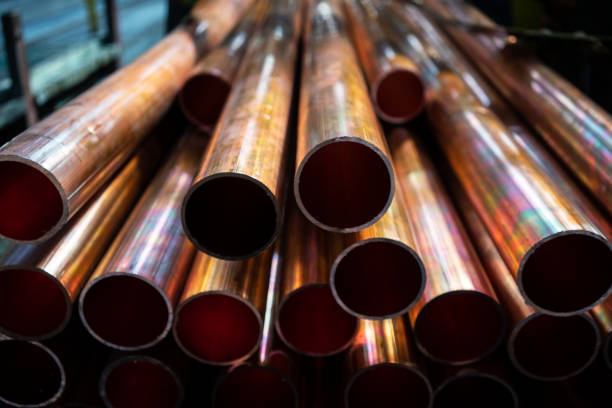Copper Pipes
Copper Pipes: Timeless Plumbing with Modern Benefits

Copper pipes are a trusted choice in plumbing thanks to their durability, corrosion resistance, and ability to maintain clean water flow. Used across residential, commercial, and HVAC systems, they can last for decades with minimal upkeep. Plus, copper is highly recyclable, making it one of the most sustainable piping materials available. Let’s explore how copper continues to outperform alternatives and support safer, smarter plumbing.
History and Evolution
Copper’s plumbing legacy stretches back thousands of years:
- Ancient Civilizations – Egyptians and Romans used copper for water systems, recognizing its hygienic and durable qualities.
- 20th Century Boom – Advances in manufacturing made copper pipes more accessible for homes and cities.
- Today – Copper remains a leading material due to its safety, longevity, and adaptability in modern plumbing.
Modern suppliers offer top-quality products suitable for both professionals and DIYers.
Types of Copper Pipes
Choosing the right copper pipe depends on application needs:
| Type | Wall Thickness | Common Uses |
|---|---|---|
| Type K | Thickest | Underground, high-pressure lines |
| Type L | Medium | Interior water supply |
| Type M | Thinnest | Low-pressure residential plumbing |
Don’t forget to select proper fittings to ensure leak-free connections and code compliance.
Key Advantages
Copper pipes offer compelling benefits:
- Long Lifespan – Decades of service with minimal failures
- Corrosion Resistance – Stable performance in various environments
- Energy Efficiency – Excellent heat retention for hot water systems
These properties translate into lower maintenance and reduced long-term costs.
Applications in Homes & Businesses
Copper pipes shine in a range of settings:
- Residential: Water lines, HVAC refrigerant lines, indoor hot/cold systems
- Commercial: Fire sprinklers, high-pressure mains, medical gas systems
Their cleanliness, strength, and versatility make them ideal for both small and large-scale installations.
Comparing Copper to Other Materials
Each plumbing material has its strengths. Let’s compare:
| Material | Benefits | Drawbacks |
|---|---|---|
| Copper | Durable, safe, recyclable | Higher upfront cost |
| PEX | Flexible, cost-effective | UV-sensitive, less heat resistance |
| CPVC | Handles hot water, easy to install | Brittle in cold climates |
| Galvanized Steel | Strong, long legacy usage | Prone to internal rust, heavy |
Copper often wins in safety, reliability, and long-term value.
Installation Techniques
For successful installation:
- Measure and Cut – Use a pipe cutter for clean edges.
- Prep for Soldering – Clean thoroughly and apply flux.
- Heat Evenly – Avoid overheating to protect pipe and fittings.
- Secure & Support – Prevent movement and vibration stress.
- Insulate – Improve energy efficiency and condensation protection.
Proper installation ensures long-lasting performance and fewer call-backs.
Maintenance Tips
Preserve copper’s strength with routine care:
- Inspect for leaks, buildup, or discoloration
- Flush to remove sediment
- Use compatible fittings to avoid mixed-metal corrosion
A little maintenance goes a long way toward preventing costly issues.
Safety & Health Benefits
Copper offers distinct health advantages:
- Bacteria-resistant surface minimizes contamination risk
- No chemical leaching compared to some plastics
- Reliable water quality for drinking and daily use
Its natural properties support a cleaner, safer home environment.
Cost and Budgeting Tips
Copper’s cost profile includes:
- Upfront Costs: Higher than PVC or PEX, but offset by durability
- Labor: Skilled installation (soldering, fitting) may add expense
- Market Price Fluctuation: Monitor copper prices when budgeting
Planning ahead helps balance quality with affordability.
Environmental Impact
Copper is a sustainability superstar:
- 100% recyclable with no loss in quality
- Often reused in new pipe production
- Long life reduces material waste
Choosing copper supports eco-conscious construction and reduces landfill contributions.
Frequently Asked Question
Can Copper Pipes Be Used With Well Water Systems?
Yes—but it depends on water quality. Acidity and mineral content can affect corrosion rates. Periodic water testing and pipe inspection help ensure safe performance.
Final Thoughts
Copper pipes represent a blend of ancient wisdom and modern reliability. Though alternatives exist, copper consistently proves itself through strength, safety, and sustainability. While the upfront investment may be higher, the peace of mind and performance payoff are unmatched. Whether you’re a builder, renovator, or homeowner, copper is a smart, enduring choice that brings lasting value.




